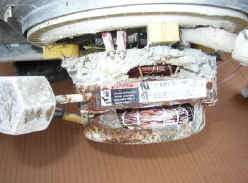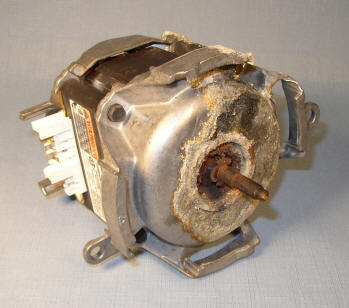I confess to never being a
big fan of GFI receptacles.
Like nearly everything else we form opinions about, it goes
back to my upbringing. Please allow me a few lines to
explain.
I grew up (you'd probably argue that point
if you knew me well!) spending as much time as possible
in my Dad's motor repair shop, and have never been afraid of
electricity (respect and fear differ, btw <grin>).
One of my earliest memories
of the shop was 'arc-drawing' pictures on Dad's big old bench
vise.
We did this by plugging a
patch cord into his 'test board' and attaching one side of the
120 volts to the vise mounting bolt with one alligator clip, and
drawing pictures with the other.
It was great fun and looked
pretty dramatic to a little kid, with sparks flying all over (not
to mention the cool static it caused on my sister's radio
<g>). I can still smell the ozone that came from this game,
and there wasn't a 'bare' spot on that entire, tortured old vise!
By the way, one of those test
boards is a very handy tool if you do much electrical testing on
your bench. Just a board with two porcelain pull-chain sockets
and a receptacle attached, hung on the wall above the
bench.
The sockets are wired in
series with the 'hot' side of the receptacle, allowing different
sized bulbs and higher wattage 'cone' heaters to be quickly
connected in series with a load under test. I use mine all
the time, and it's extremely handy.
Anyway, getting back to GFI's,
when these devices came on the scene, my whole family snickered.
I mean, why would anyone need such high tech protection from just
120 volts? What wimps!
My electrician brother and I
used to see what wattage bulb we could screw into that test board
and still 'hang on' to (He always won - might explain that
twitch...)
Throughout my career as an
appliance technician, I've dealt with far too many 'nuisance
trips' of GFI's. Especially memorable are those dead food
freezers whose contents spoiled several days before anyone knew
the blasted GFI had tripped off. Those experiences further
'soured' my opinion of this 'unnecessary complication'.
But I say all that to say
this (thank goodness - he DOES have a point!): There's a place
for these devices, and it's in an application I never used to
recommend: connected to an appliance with a motor.
The 'fatal' dishwasher
failure I see most often, at least on the most common vertical
shaft models, is motor failure due to water leaks through the
pump seal, located just above the motor on this
design. Here's one that wasn't caught nearly early
enough to save:

Trouble is, the
leak often develops so slowly, by the time it's noticed, the
motor's been damaged beyond repair. The secret to preventing this
damage is discovering that slow leak as early as possible.
I've a colleague out West
who's invented a clever little tray to mount under dishwashers.
It's designed to divert any water leaks out the front, where
they're quickly noticed. It's a great idea, and I plan on getting
some of those, and will keep you up to date on that.
But another 'ounce of
prevention' is to wire the dishwasher to a GFI circuit. This is
done in many newer homes, but around here, I seldom see it.
In the past 6 months, I've
been able to 'save' two really nice dishwashers from the usually
fatal leak, due to GFI's. In the same time period, though, I've
also 'DOA'd' and scrapped 3 or 4 with water-ruined motors
in machines that no one knew had been leaking.
So I've begun recommending
that dishwashers be connected to a GFI circuit whenever possible.
I'm pretty sure that's already required in many parts of the US,
but evidently it's not here in our area yet.
The reason this works so well
is simple. When a failed pump seal allows water to find its way
into the motor windings, the resultant electrical leakage to
ground trips the DW's GFI circuit breaker or GFI receptacle, the
machine goes dead, and I get a call.
After replacing the seal kit,
the machine's back up and running in under an hour, and well
under half the price of a new one.
So maybe I'm getting 'soft'
as I age, but I guess GFI's do have their place. (How about it,
brother? 100 watts, no GFI? [twitch])
Update,
December 2006:
I've been finding out, the hard way, that GFI's don't usually save 'Tall
Tub' model dishwashers. The reason is, unlike earlier vertical shaft
wash motors we talked about above, these critters use a motor whose
shaft mounts horizontally under the tank to save space.
The water from a rotary seal
leak, starting small, never makes it to the motor windings in these
machines, but destroys the motor bearing before anyone realizes there's
a problem. The first symptom's most often a low hum as the motor tries
to start, but can't because its bearing's bound.
Here's the motor out of one
of several otherwise gorgeous tall tub dishwashers that I've had to
scrap recently. This one was only 4 years old:

Depressing, because these machines aren't cheap, and new motor/pump
assemblies for them aren't either!
Was this article helpful?
Please click the "donate" button on the left side of
this page to help me keep this information free!
Many Thanks! - Dave
Copyright www.DavesRepair.com
This article may be reprinted and distributed freely only
in its entirety, including this message.